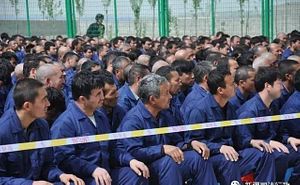In April 2019, the secretary-general of the United Nations, António Guterres, spoke at the Second Belt and Road Forum for International Cooperation. He told the assembled world leaders and Chinese Communist Party General Secretary Xi Jinping: “I want to recognize China for its central role as a pillar of international cooperation and multilateralism.”
In the light of a remarkable leak of over 400 pages of material to the New York Times revealing the cruelty of the Communist Party’s assault on the Uyghurs, I would now like Mr. Guterres and other world leaders to publicly recognize China for its central role in undermining international rights standards and committing crimes against humanity in East Turkestan. [Editor’s note: East Turkestan is many Uyghurs’ preferred name for the Xinjiang region.]
The time when political leaders could visit Beijing, raise concerns in private about human rights, and go home with a trade deal are over. The international community no longer has an excuse to stay silent. It must act.
For nearly three years activists, journalists, and academics have slowly pieced together evidence of alarming human rights abuses in East Turkestan. We have studied open source procurement notices on the internet, interviewed camp survivors, and compared satellite images of probable camp locations. Uyghurs living overseas have bravely related accounts to the media and at events of lost relatives. The Chinese Communist Party’s response has been that these reports are all a big lie, a Western hoax conjured to mute a rising China. This provided enough cover for states to mute their criticism, or worse, praise China’s brutal policies. No one now should be in doubt the Uyghur nightmare is real.
The document leak to the New York Times is a damning indictment of the CCP’s genocidal intent toward the Uyghurs and other Turkic peoples. The Chinese government narrative that its modern-day concentration camps are really “vocational training centers” is only for the gullible, terrified, and complicit.
The leaked papers indicate responsibility for this tragedy lies with Xi Jinping, who told officials to show “absolutely no mercy” in effecting their repression. Xi’s regional henchman, Chen Quanguo, who called for a “smashing, obliterating offensive” in 2017 and issued an order to “round up everyone who should be rounded up,” shares accountability for the systemic internment, torture, and deaths of Uyghurs. In the documents, the Uyghur peoples’ existence is reduced to little more than an illness that can only be cured through ideological purity.
It is this pursuit of absolute adherence to directives and ideology that proved the Party’s weakness. To keep officials ruthless enough to carry out systematic mass atrocities over time, regimes of terror must have systems to terrorize their own officials as well. Astonishingly, the need for total control of narratives went as far as scripting what officials should tell children whose parents had been interned. However, individuals will not always respond in the ways you want them to, even if enormous pressure is applied. At some point, opposition becomes inevitable. The leaked papers reveal the party opened 12,000 investigations into officials who lacked the necessary fervor to implement the government’s policies. However, it is the whistleblower, “a member of the Chinese political establishment,” whose leak to the New York Times sent the clearest message to Beijing of opposition and condemnation.
Now the international community has to finally show its bravery. While advocating for the closure of the camps, the Uyghur Human Rights Project has called for an end to business as usual with China. China’s model of “no mercy” repression and data-led surveillance was tested on Uyghurs and is now being cited as an example for dealing with protests in Hong Kong. The technologies of this model have been profitably exported overseas to willing states looking to quell opposition in their own backyard. What is happening to the Uyghurs may no longer seem so far away.
The leaked papers compel us to not only halt the advance of dictatorships, but also to end the Uyghur catastrophe. In the United States, there is a legislative instrument primed to demonstrate international action on untenable conditions in East Turkestan. In Congress, the Uyghur Human Rights Policy Act (S.178 and H.R.649) has been teetering for almost one year. It is time to pass the measure. Other countries should follow this model of accountability and not China’s turn toward totalitarianism.
Omer Kanat is the Executive Director of the Uyghur Human Rights Project and a former journalist for Radio Free Asia.

































